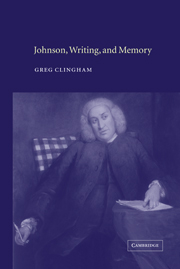Book contents
- Frontmatter
- Contents
- Acknowledgments
- List of abbreviations
- Introduction: Johnson and authority
- 1 Johnson and memory
- 2 Johnson and nature
- 3 Law, narrative, and memory
- 4 Narrative, history, and memory in the Lives of the Poets
- 5 Translation and memory in the Lives of the Poets
- 6 Historiographical implications
- Notes
- Bibliography
- Index
5 - Translation and memory in the Lives of the Poets
Published online by Cambridge University Press: 22 September 2009
- Frontmatter
- Contents
- Acknowledgments
- List of abbreviations
- Introduction: Johnson and authority
- 1 Johnson and memory
- 2 Johnson and nature
- 3 Law, narrative, and memory
- 4 Narrative, history, and memory in the Lives of the Poets
- 5 Translation and memory in the Lives of the Poets
- 6 Historiographical implications
- Notes
- Bibliography
- Index
Summary
It is a commonplace that Dryden and Pope are the great translators of the English seventeenth and eighteenth centuries, but in the present chapter I wish to argue that Johnson's Lives construes them not incidentally but fundamentally as literary and historical translators, that Johnson understands their respective literary characters as reflecting a translational relationship with language, texts, and the world, and that the narrative of literary history he constructs in the Lives sees their formal translations as constituting their most characteristic work. I am also interested in Johnson's rhetorical complicity in this narrative, and how it contributes to the translational nature of the Lives themselves. Partly because of the relational and prefatory structure of the Lives – in which Johnson's remarks are always pitched at some invisible other, which is the writing under discussion – there is a qualitative difference between the function of memory in the lives of Dryden and Pope and in Johnson's moral essays, making the Lives more than exemplifications of a “theoretical” structure discussed in the first three chapters. Attitudes to language, time and history that Johnson encountered in the two poets are developed in his narrative, asking us, I suggest, to see the Lives not only as great biographies, literary histories and historiographies, but as translations in the Renaissance vein.
The lives of Dryden and Pope frame the fifty-two Lives in important ways.
- Type
- Chapter
- Information
- Johnson, Writing, and Memory , pp. 122 - 157Publisher: Cambridge University PressPrint publication year: 2002



